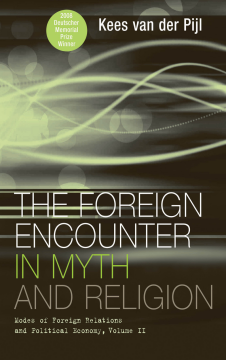
Additional Information
Book Details
Abstract
How do we think about international relations? There is no question that society is based upon its cultural foundations, yet this mode of understanding the world is seemingly absent from IR.
The second volume of Modes of Foreign Relations and Political Economy, a three-volume project changing the way we think about international relations, traces the key characteristics of 'foreign encounters' over time. It shows that myth, religion and ethical philosophies have always informed the way that societies have interacted with outsiders, from tribal relations to the imperial frontiers. Acceptance of this points us towards the future state of international relations.
A truly masterful work, The Foreign Encounter In Myth And Religion, is a must for upper-undergraduates and academics at the cutting edge of international relations theory.
'An exploration of the mythical, religious, cultural and ideological themes through which the historically and geographically distinct communities' modes of foreign relations have been understood, organised and narrated'
Radhika Desai
'Challenges us to understand the world in its full complexity and contradictory actuality'
Peter Bratsis
'A brilliant treatise on the 'foreign encounter'. Magisterial in scope, this book reshapes our conception of historical temporalities, civilisational flows and international relations'
Mustapha Kamal Pasha, Sixth Century Chair in International Relations, University of Aberdeen
Table of Contents
| Section Title | Page | Action | Price |
|---|---|---|---|
| The Foreign Encounter in Myth and Religion | cover | ||
| Contents | iv | ||
| Preface | v | ||
| Acknowledgements | xiii | ||
| 1. Tribal Foreign Relations and Mythical Ancestry | 2 | ||
| Identity and Memory in Ethnogenetic Myth | 3 | ||
| Pseudo-Speciation and the Cinstitution of the Foreign | 16 | ||
| Mythical Exchanges | 13 | ||
| 2. Sedentary–Nomad Encountersin Semitic Myth and Religion | 22 | ||
| Ethnogenisis and Foreign Relations in Mesopotamian Mythology | 22 | ||
| Imperial and Nomadic Antecedents of the Semitic Monotheisms | 34 | ||
| Foreign Relations in the Bible and the Koran | 51 | ||
| 3. Warrior Heroes in theIndo-European Lineage | 70 | ||
| From Aryan-Dravidian Synthesis to Hindu Nationalism | 70 | ||
| Heroes of the Hellenic World in the Mirror of Western Imperialism | 87 | ||
| Warrior and Fertility Myths from the Scythians to Wagner | 103 | ||
| 4. Imperial Cosmologies andthe Nomad Counterpoint | 118 | ||
| Imperial Confucianism and Frontier Buddhism | 119 | ||
| Contending Buddhisms on China’s Frontier | 129 | ||
| Fromtier Origins and Imperial Transformation of Roman Christianity | 134 | ||
| Crusaders and Muslims | 144 | ||
| 5. Rival Fundamentalisms on the Imperial Frontier | 163 | ||
| Militant Calvinism and Western Hegemony | 164 | ||
| Zionism and Jewish Fundamentalism in Israel | 174 | ||
| Islam the New Nomad Creed? | 189 | ||
| References | 208 | ||
| Index | 220 |
